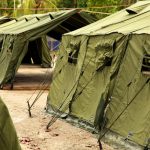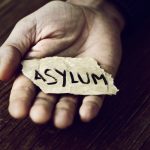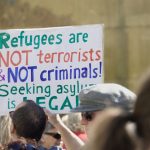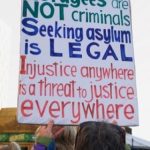From One Prison to Another: Medevac Detainees Face Uncertain Future
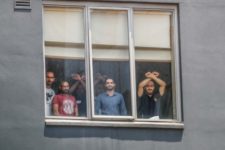
More than 40 men are being detained in a hotel in Melbourne’s northern suburbs, in what might as well be called ‘no man’s land’.
Evacuated from Papua New Guinea under the previous medevac transfer system, they are now stuck in limbo, at the mercy of yet another political decision that has put their lives at risk.
Some of these men arrived at the Mantra hotel as far back as July, brought to Australia under the original medevac laws introduced at the end of 2018, which allowed sick asylum seekers and refugees to be transferred to Australia for treatment on the recommendation of an expert medical panel.
But those laws were recently repealed in Parliament, and the future of these men is uncertain.
It’s been reported that Border Force is refusing to send them back to PNG, and is also refusing to explain in detail why the men are in a hotel rather than hospital, or how long they will remain there, except to say:
“Once transferees no longer need to be in Australia for the temporary purpose for which they were brought [medical treatment], they are expected to return to a regional processing country,” … adding that the department “does not discuss individual cases, nor their medical treatment, for privacy reasons”, but all people in immigration detention have access to medical care “as required”.
Dental problems, asthma and mental health issues are the main health problems plaguing the men. It’s understood that most of them have been found to be refugees, although 15 have had their asylum claims rejected.
Refugee advocates have held demonstrations outside the Mantra hotel to draw attention to the plight of the men, claiming that the hotel did not provide sufficient access to open space or medical care – but this is hardly the fault of the hotel itself, considering that it is, in fact a hotel, and not a health or medical centre or rehabilitation facility.
Hotel conditions are ‘worse’ than offshore detention
Figures suggest that about 180 people transferred from Manus and Nauru under medevac provisions have been sent to hotels, apartments and detention facilities across the country. For many, living conditions now are worse than their living conditions in offshore detention.
In Melbourne, the men sleep 2-3 to a room. While they are allowed to use the hotel gym for two hours a day while other guests are not permitted to use the facilities. They are only permitted outside by applying to the a visit to the Melbourne Immigration Transit centre, where they can walk behind the high-fenced walls.
One female medevac detainee in Brisbane is locked in a hotel room with security guards stationed permanently in the corridor. She says the guards enter her room at night and causing her ongoing panic attacks. When she has to leave for an appointment, two security staff escort her “like a criminal” by gripping her upper arms.
If she needs to leave the hotel for any reason, including to attend medical appointments, she is subjected to regular body searches by security staff.
While a small comfort is that the courts ruled she must be detained close to family members who also reside in Brisbane while getting treatment, family visits are only rarely permitted. Her desire to actually go outside in the fresh air is diminished too, by the invasive procedure she has to endure to do so.
The Australian Human Rights Commission handed down a report earlier this year, recommending that hotels be used only as “alternative places of detention” and only in exceptional circumstances and “for very short periods of time”.
In response, the Department of Home Affairs said hotels were used as “transit accommodation” and generally only for detainees who were staying for a short period.
But many of these people have already several weeks, some even months. And their stay could be much longer now that the original system which brought them here no longer exists.
While many are being held in hotel rooms, other detainees report being moved regularly between cities and transit centres, and hotels, and while they are being treated by International Health and Medical Services (IMHS), the same organisation that treats detainees offshore, continually moving means a lack of continuity in care.
As a result, most are still not getting the health outcomes they need, particularly those with serious mental and emotional problems, caused in many cases by circumstances that led them to flee their home countries, then exacerbated by their poor treatment they’ve received in Australia’s offshore detention centres.
It has been well documented that prolonged detention can cause serious mental health problems. Recovery is not smooth, simple or quick. And usually specialist treatments are required.
So, what happens now for these sick medevac detainees?
What happens now for these people is far from certain. In a cloud of controversy, the original medevac laws, which guaranteed sick refugees a transfer to Australia for treatment, were repealed at the start of this month after Tasmanian MP Jackie Lambie allegedly did a secret deal with the government in return for her vote to scrap the laws.
Essentially, the repeal means that powers of approval or refusal for medical transfers have been fully restored to home affairs minister Peter Dutton.
And right now, there seems to be no real plan in place to deal with the people stuck in the middle. As they continue to languish in hotel rooms Australia’s international reputation as a compassionate nation continues to take a beating.
Worse still, many Australians are disgusted and outraged that their tax dollars are not being more thoughtfully spent by the Federal Government, to provide treatments and long-term outcomes that deliver some certainty to these people who’ve arrived in Australia seeking refuge from displacement and trauma, not perpetuate it.



